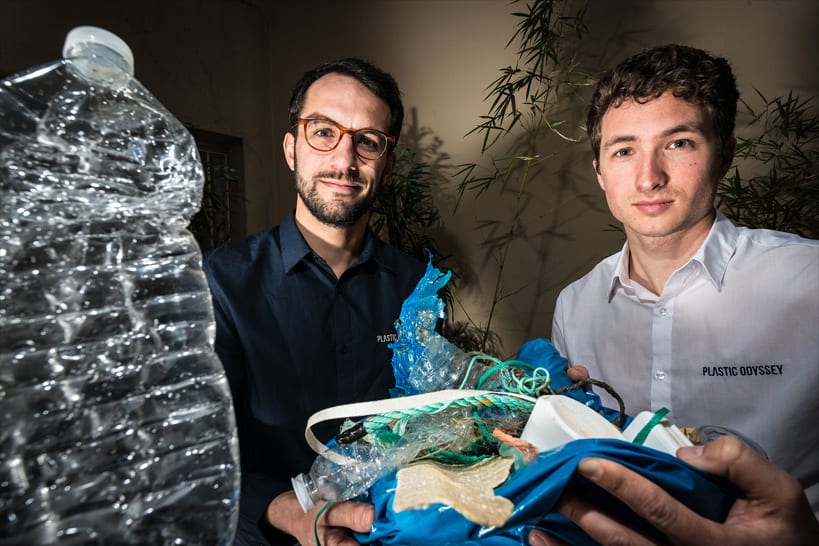A unique vessel powered solely by plastic waste is preparing to embark on the first-round-the-world expedition of its kind, raising awareness about plastics in our oceans and alternative options for recycling and fuel production.
Monaco Life spoke to Simon Bernard, co-founder of Plastic Odyssey, who will be sharing details of this incredibly ambitious project at the Transition Forum in Monaco this June.
“19 tons of plastic enter the ocean every minute. Once at sea, it’s too late. The problem must be tackled at its roots by collecting and recovering plastic waste before it enters the ocean.”
Simon Bernard is a French merchant navy graduate, former deck and engine officer, who is passionate about finding solutions to environmental issues. After conducting several studies on eco-friendly ships, CO2 emission reduction, and low technologies for developing countries, he founded Plastic Odyssey, an NGO that aims to reduce the ocean’s pollution by promoting plastic recycling solutions adapted to developing countries.
He and his team have created an oceanographic catamaran that transforms plastic waste into fuel thanks to a pyrolysis unit stored onboard.
Simon, what motivated you to find solutions to reduce pollution in the ocean?
I have always lived by the sea and I can say that I am an ocean lover. I am convinced that ocean conservation is crucial to the survival of humanity. The ocean regulates the climate, provides us with oxygen and is home to thousands of species.
The recovery process that you propose is the last in a line of strategies that can be employed to fight plastic pollution. Why do you think this step should be included in the chain?
Even though the first thing we see in the media about Plastic Odyssey is plastic to fuel, we do work on all the chain. We carry out two actions in parallel:
- Working on solutions to “cleanup the past” by developing small scale recycling plants adapted to emerging countries to get rid of the five billion tons of plastic that is currently in nature and flows partly in to the Ocean. This include working on sorting, shredding, mechanical recycling and eventually plastic to fuel;
- Build the future by promoting alternative and reduction solutions to reduce the plastic consumption and footprint.
These two goals will be highlighted in two areas of our ambassador boat to showcase and spread solutions around the world.

In 2020 you will head off on a three-year expedition around the world on a boat powered solely by plastic waste. Tell us about the vessel and how it will be able to turn waste into fuel on board…
The aim of the boat isn’t to clean up the ocean and make fuel. It can better be seen as a floating ambassador of concrete solutions to reduce plastic and recycle it. The technologies embarked upon will be tested and improved at each port of call in order to demonstrate that solutions exist and can be replicated in the different cities visited.
The fact that the boat will be powered by the fuel produced during the demonstration phase of the pyrolysis unit is a good way to raise awareness and show that plastic is too valuable to be left in the nature.

Will this process be creating more CO2? And if so how is this environmentally responsible?
Turning plastic back into fuel is the last step of recycling (when no other option is possible). If we consider that the fuel replaces virgin oil that otherwise would have been extracted, refined and transported, the process actually cut out 10 to 20% of CO2. This is without taking into account that the plastic could have been open burned in landfill otherwise. To sum up, plastic to fuel is not the energy of the future but a good transition before we stop producing fuel and single use plastics.
Developing green energy solutions is an economic choice for many in the industry, but your developments are free of rights and not patented. Why?
We believe open-source is the only option to solve the major environmental issues we are facing. It allows the solutions to be spread much faster while enabling improvements easier. As Einstein said, we cannot solve our problems with the same thinking we used when we created them.
Why have you decided to take part in the Transition Forum?
It’s a great opportunity to share our vision to tackle environmental issues and inspire people
